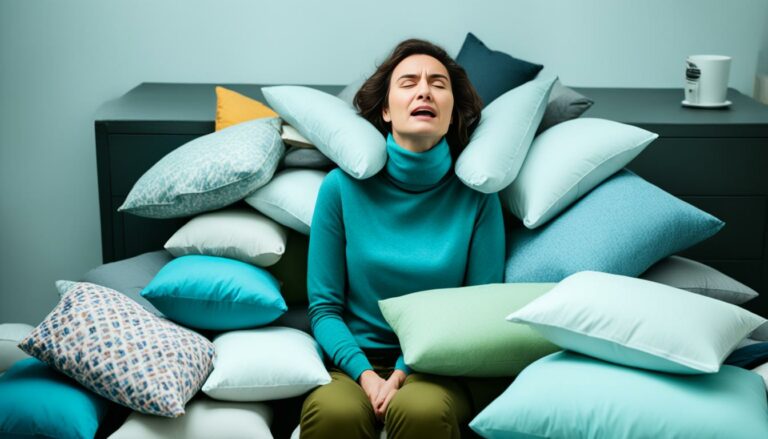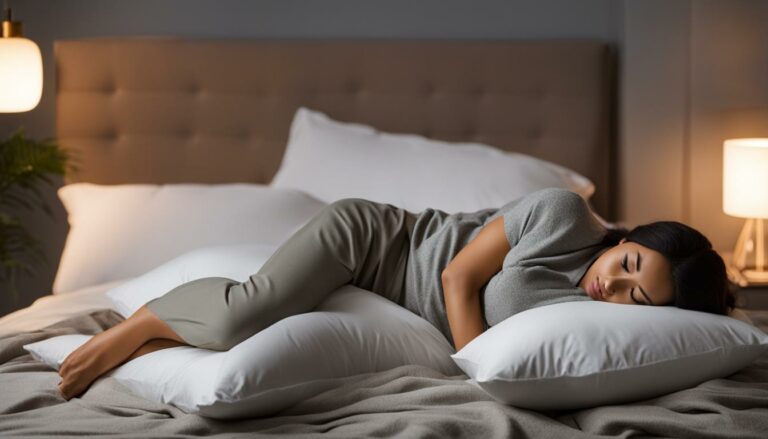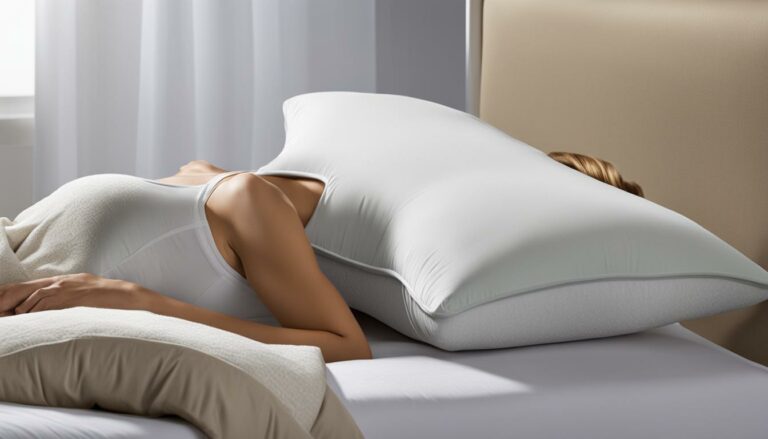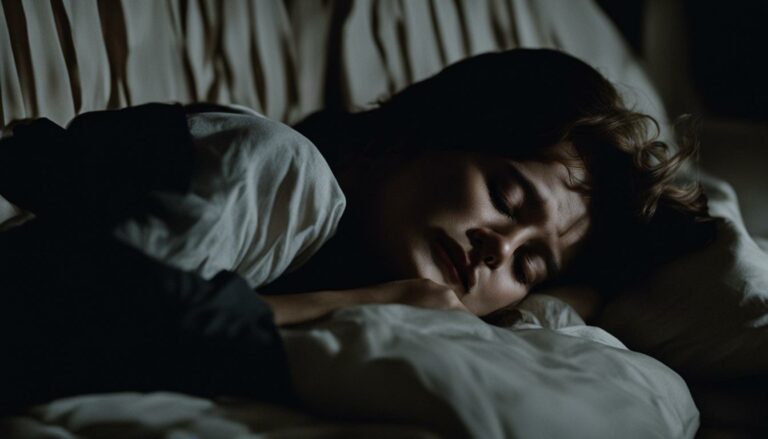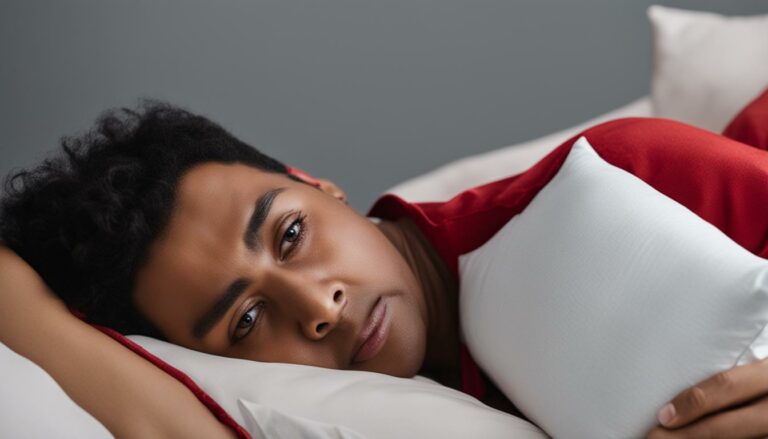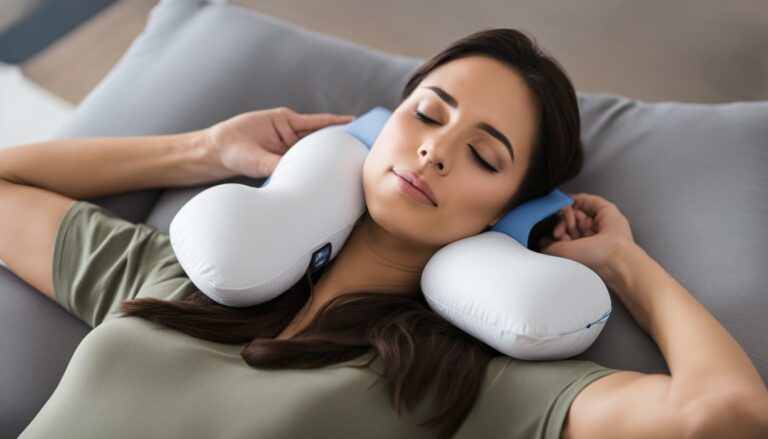Can My Pillow Cause Headaches? Find Out Now!
Eric Christie stands as a luminary in the bedding industry, with a career spanning nearly four decades since the early 1980s. His journey through the world of bedding has seen him wear many hats – a manufacturer, designer, and retailer, showcasing his versatility and expertise in Read more...
pillowsandbedsheets.com and its partners may earn a commission if you purchase a product through one of our links
Headaches are a common occurrence, but they shouldn’t be considered normal. According to the World Health Organization, while almost everyone experiences occasional headaches, only about 5% of adults suffer from headaches nearly every day. This means that if you fall into that category, you may be looking for a solution to your frequent headaches. There are various factors that can contribute to the onset of both sporadic and chronic headaches, including elements in your bedroom setup. In this article, we’ll explore whether pillows can cause headaches and what you can do to prevent them.
Key Takeaways:
- Pillows can contribute to the onset of headaches
- Choosing the right pillow for your sleeping position is crucial
- Neck and spine misalignment can lead to morning headaches
- Sleep disorders and dehydration can also cause headaches
- Addressing underlying health conditions and practicing good sleep hygiene can help prevent headaches
The 6 Most Common Types of Headaches
Headaches come in various types, each with its own unique characteristics and symptoms. It’s important to identify the type of headache you’re experiencing to determine the appropriate treatment.
1. Cluster Headaches
Cluster headaches are rare but intensely painful headaches that occur in cyclical patterns, often around the eye or temple. They are known for their severe pain and can last from weeks to months, followed by periods of remission.
2. Tension Headaches
Tension headaches are the most common type of headache. They typically cause a dull, steady ache on both sides of the head and are often caused by stress, muscle tension, or poor posture.
3. Sinus Headaches
Sinus headaches are caused by inflamed or blocked sinus passages. The pain is typically localized in the forehead, cheeks, or bridge of the nose and often worsens with movement or bending forward.
4. Migraine Headaches
Migraine headaches are characterized by intense, throbbing pain, often on one side of the head. They are typically accompanied by other symptoms such as nausea, sensitivity to light and sound, and visual disturbances.
5. Thunderclap Headaches
Thunderclap headaches are sudden and severe headaches that reach their peak intensity within seconds. They can be a sign of a serious underlying condition and require immediate medical attention.
6. COVID Headaches
COVID headaches are a common symptom of COVID-19 and long COVID. These headaches can vary in intensity and duration and are often accompanied by other COVID-related symptoms.
Understanding the specific type of headache you’re experiencing can help you and your healthcare professional determine the best course of action for relief and prevention.
5 Ways Pillows Can Cause Headaches
While pillows are intended to provide comfort and support, they can also contribute to the occurrence of headaches. Understanding the potential ways pillows can trigger headaches can help you make informed decisions when choosing the right pillow for a peaceful night’s sleep.
- Wrong Pillow for Sleeping Position: Using the wrong pillow for your sleeping position can result in improper neck alignment and muscle tension. Whether you sleep on your back, side, or stomach, it’s important to find a pillow that provides adequate support and maintains proper spinal alignment during sleep.
- Improper Support: Pillows that offer inadequate support can lead to neck pain and headaches. If your pillow is too firm or too soft, it may not properly cushion your neck, resulting in discomfort and tension that can contribute to headaches.
- Allergies to Pillow Fill: Allergies to the fill material in pillows can trigger sinus headaches. Common pillow fill materials include down, feathers, foam, and synthetic fibers. If you have known allergies, it’s essential to choose a hypoallergenic pillow that reduces the risk of triggering allergic reactions.
- Pillow Is Too Old: Using an old and worn-out pillow can result in pain and allergies. Over time, pillows lose their shape, support, and hygiene, making them less effective in providing comfort and proper neck alignment. It’s recommended to replace pillows every 1-2 years for optimal support and hygiene.
- Sleeping with Too Many Pillows: Sleeping with too many pillows can cause muscle tension and headaches. When you stack multiple pillows under your head, it can strain the neck and upper back muscles, leading to discomfort and headaches. It’s best to use a single pillow that provides adequate support without excessive elevation.
By understanding these potential causes, you can choose a pillow that suits your specific needs and provides the proper support to prevent headaches. Investing in the right pillow can make a significant difference in your overall sleep quality and well-being.
How Can I Stop Waking Up with a Headache?
If you frequently wake up with a headache, it can be frustrating and disrupt your day from the start. Fortunately, there are several strategies you can try to prevent those early morning headaches.
- Get Extra Rest: Ensuring you get enough restful sleep is crucial for headache prevention. Aim for at least 7 hours of uninterrupted sleep per night to give your body the time it needs to recover and recharge.
- Proper Hydration: Dehydration can be a common cause of headaches, including those in the morning. Make sure to drink enough water throughout the day to stay adequately hydrated and prevent dehydration headaches.
- Address Sleep Disorders: If you suffer from sleep disorders such as sleep apnea or snoring, it’s essential to seek proper treatment. These conditions can contribute to morning headaches by disrupting your sleep and reducing oxygen levels.
- Manage Stress: Stress can have a significant impact on your overall health and contribute to headaches. Find healthy ways to manage stress, such as through exercise, meditation, or engaging in hobbies that bring you joy.
- Maintain Good Sleep Hygiene: Establish a regular sleep schedule and create a relaxing bedtime routine. This can include activities like taking a warm bath, reading a book, or practicing relaxation techniques to promote a restful night’s sleep.
By implementing these strategies into your daily routine, you can improve your chances of waking up headache-free and start your day off on the right foot.
Neck & Spine Misalignment
One of the primary causes of waking up with headaches is neck and spine misalignment.
Using pillows that are either too thin or too thick can tilt the head in an awkward position, leading to improper alignment and potential headaches.
It’s essential to choose a pillow that allows the head to rest in a neutral position, with the appropriate thickness to support the natural curve of the neck.
For stomach sleepers, a flat and soft pillow is recommended to minimize strain on the neck.
Side sleepers, on the other hand, require lofty and supportive pillows to keep the spine aligned properly.
Back sleepers should opt for medium loft pillows that conform to the head and neck, supporting the natural curve of the spine.
Pillow Types for Different Sleeping Positions
| Sleeping Position | Pillow Type |
|---|---|
| Stomach Sleepers | Flat & Soft Pillows |
| Side Sleepers | Lofty & Supportive Pillows |
| Back Sleepers | Medium Loft Pillows |
Choosing the right pillow for your sleeping position can greatly reduce neck and spine misalignment, promoting a better night’s sleep without the added discomfort of headaches.

Pillow Firmness
The firmness of a pillow can have a significant impact on your comfort and the onset of headaches. It’s important to find the perfect balance between softness and support to ensure a good night’s sleep. Pillows that are too hard or too soft can cause discomfort and lead to pain in the head and neck area. While a hard pillow may apply too much pressure to your head, a soft pillow can cause your head to sink at an uncomfortable angle.
When selecting a pillow, opt for one with medium firmness. A medium-firm pillow provides adequate support to your head and neck, promoting proper alignment and reducing the risk of headaches. The resilient foam used in SONU mattresses’ support pillows is designed to prioritize your comfort and prevent any potential discomfort that might arise from inadequate support.
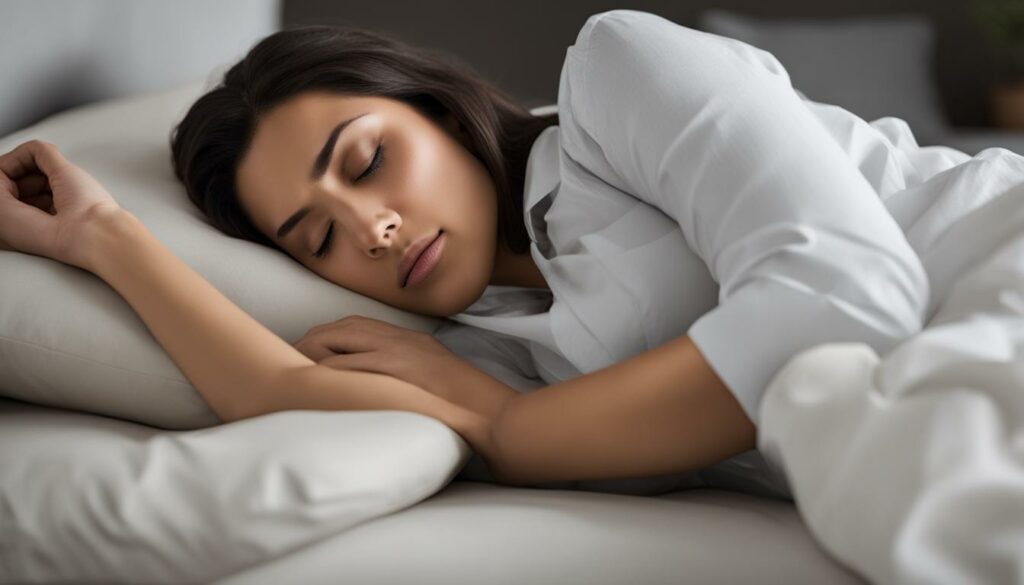
| Pillow Firmness | Characteristics |
|---|---|
| Soft | Pillow sinks easily under the weight of your head |
| Medium | Pillow strikes a balance between softness and support |
| Firm | Pillow offers a higher level of support and less give |
Sleep Disorder
Morning headaches can be a symptom of underlying sleep disorders such as sleep apnea and snoring. Research has shown that a significant percentage of individuals with sleep apnea and strong snorers experience morning headaches. These conditions can lead to disrupted sleep and reduced oxygen levels, triggering headaches upon waking. If you suspect you have a sleep disorder, it’s essential to seek medical evaluation and treatment to alleviate morning headaches.
If left untreated, sleep apnea and snoring can have long-term impacts on your health and overall well-being. Sleep apnea is a sleep disorder characterized by pauses in breathing or shallow breathing during sleep. These pauses can last for a few seconds to minutes and may occur multiple times throughout the night. Snoring, on the other hand, is the result of obstructed airflow in the throat, leading to the vibrating sound.
| Sleep Disorder | Symptoms |
|---|---|
| Sleep Apnea | Morning headaches, excessive daytime sleepiness, loud snoring, gasping or choking during sleep |
| Snoring | Morning headaches, tiredness throughout the day, restless sleep, difficulty concentrating |
Both sleep apnea and snoring can disrupt your sleep patterns and affect the quality of your rest. When your sleep is constantly disturbed, your brain and body don’t get the rejuvenating sleep they need, which can result in morning headaches and other health issues.
It’s important to consult with a healthcare professional if you suspect you have a sleep disorder. They can perform a comprehensive evaluation, which may include a sleep study, to diagnose the specific condition and recommend appropriate treatment options. Treatment for sleep apnea may involve continuous positive airway pressure (CPAP) therapy or the use of oral appliances to keep the airway open during sleep. For snoring, lifestyle changes such as weight loss, sleep position adjustments, and the use of anti-snoring devices may be recommended.
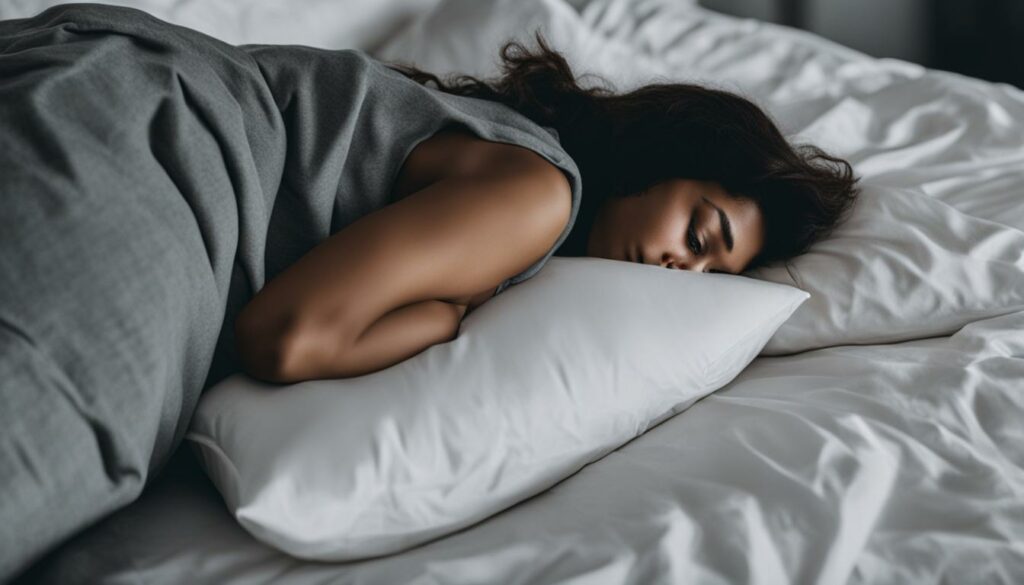
Addressing and treating sleep disorders can significantly improve your sleep quality and help alleviate morning headaches. By working with a healthcare professional, you can find the right solution for your specific sleep disorder and get the restful, headache-free sleep you deserve.
Dehydration
Dehydration is a common cause of headaches, including morning headaches. Not drinking enough water can lead to headaches, fatigue, and reduced cognitive function. To prevent dehydration-related headaches, it’s important to drink an adequate amount of water throughout the day. The recommended daily water intake for adults is at least 8 cups or 64 ounces. Staying hydrated can help maintain overall health and prevent various types of headaches.

Restless Legs Syndrome (RLS)
Restless Legs Syndrome (RLS) can be a contributing factor to tension headaches and migraines. The connection lies in the shared brain pathways between the legs and the head. RLS is characterized by discomfort and an irresistible urge to move the legs. This condition can disrupt sleep and contribute to the onset of headaches.
RLS is often associated with iron deficiency, as low levels of iron can contribute to the development of the syndrome. Iron deficiency affects the production of dopamine, a neurotransmitter involved in regulating movement and mood. When iron levels are insufficient, it can lead to disturbances in the brain pathways linked to RLS, causing discomfort and movement impulses that may trigger tension headaches and migraines.
If you suspect you have RLS, it is essential to consult with a healthcare professional for proper diagnosis and treatment. Addressing any underlying iron deficiency through dietary changes or iron supplementation can help alleviate associated headaches. Additionally, managing RLS symptoms through medication and lifestyle adjustments can improve sleep quality and reduce the frequency of migraines and tension headaches.
Having a peaceful sleep and managing RLS effectively can significantly reduce the risk of headaches. Remember to prioritize your sleep health and work with a healthcare professional to address any underlying concerns.
Mood Disorders
There is a strong connection between mood disorders and pain sensitivity, including headaches. Conditions such as depression and anxiety can significantly increase the risk of insomnia and sleep disturbances, leading to headaches upon waking. These mood disorders can disrupt the natural sleep cycle, affecting the quality and duration of your rest.
It’s essential to address and treat any underlying mood disorders to improve sleep quality and reduce the likelihood of headaches. Seeking therapy or counseling can provide valuable support and guidance in managing depression and anxiety. Additionally, practicing stress management techniques, such as mindfulness and relaxation exercises, can help alleviate symptoms and improve sleep patterns.
“Understanding the impact of mood disorders on sleep and pain sensitivity is crucial in effectively managing headaches.”
Developing healthy coping strategies is also important in managing mood disorders and reducing the risk of headaches. Engaging in regular physical activity, maintaining a balanced diet, and prioritizing self-care activities can contribute to overall well-being and better sleep. Creating a calm and comfortable sleep environment, free from distractions, can also promote restful sleep and minimize the likelihood of headaches.
| Mood Disorders and Headaches | Impact on Sleep | Management Strategies |
|---|---|---|
| Depression | Disrupted sleep, insomnia | Therapy, medication, stress management |
| Anxiety | Difficulty falling asleep, sleep disturbances | Counseling, relaxation techniques, healthy coping mechanisms |
| Insomnia | Difficulty initiating or maintaining sleep | Sleep hygiene practices, cognitive-behavioral therapy, relaxation exercises |
By addressing and managing mood disorders effectively, you can improve your sleep quality, reduce pain sensitivity, and minimize the occurrence of headaches upon waking. Taking proactive steps, such as seeking professional help and adopting healthy lifestyle habits, can make a significant difference in your overall well-being and headache management.
Teeth Grinding
Teeth grinding, also known as bruxism, is a condition often associated with stress. When you grind or clench your teeth during sleep, it can lead to tension headaches or migraines. Managing bruxism is crucial in alleviating these associated headaches. One common way to manage bruxism is by wearing a nighttime dental retainer, specifically designed to prevent teeth grinding and reduce the resulting headaches. The retainer acts as a protective barrier and helps relax the jaw muscles, minimizing the grinding and clenching action that can trigger headaches.
In addition to wearing a dental retainer, it’s important to address the underlying stress that contributes to teeth grinding. Stress management techniques, such as engaging in regular exercise, practicing relaxation exercises like yoga or meditation, and seeking professional counseling, can help reduce stress levels and alleviate bruxism-related headaches.
The Benefits of Wearing a Dental Retainer
Wearing a dental retainer at night can provide several benefits in managing teeth grinding and associated headaches:
- Protects your teeth from excessive wear and damage caused by grinding and clenching
- Relaxes the jaw muscles, reducing muscle tension and pain
- Prevents the development of temporomandibular joint disorders (TMJ) associated with bruxism
- Reduces the frequency and intensity of headaches caused by teeth grinding
Proper stress management is essential alongside wearing a dental retainer to effectively address bruxism and minimize associated headaches. By adopting stress management techniques and using a dental retainer, you can take proactive steps towards managing teeth grinding and finding relief from stress-related headaches.
| Key Points | Teeth Grinding and Headaches |
|---|---|
| Condition | Bruxism (Teeth Grinding) |
| Associated Symptoms | Tension headaches or migraines |
| Management Technique | Wearing a dental retainer |
| Engaging in stress management activities | |
| Benefits of Wearing a Dental Retainer | – Protects teeth from wear and damage |
| – Relaxes jaw muscles, reducing tension and pain | |
| – Prevents TMJ disorders | |
| – Reduces frequency and intensity of associated headaches |
The Wrong Mattress
The quality and supportiveness of your mattress can have a profound impact on your sleep and overall well-being. Waking up with headaches can often be attributed to sleeping on the wrong mattress. An unsupportive mattress can lead to neck pain, back pain, and improper spinal alignment, which can trigger headaches and cause discomfort throughout the day.
It’s crucial to choose a mattress that offers proper support for your upper body and hips, ensuring a comfortable sleep position that promotes spinal alignment. A mattress with the right level of firmness and support can help alleviate pressure points and provide relief from chronic aches and pains. Investing in a high-quality mattress designed to provide adequate support and comfort, such as the SONU Sleep System, can make a significant difference in your sleep quality and overall well-being.
Don’t let a wrong mattress contribute to your morning headaches and compromised sleep. Upgrade to a mattress that prioritizes your comfort and health. By choosing a mattress that supports your body’s natural alignment, you can wake up feeling refreshed and rejuvenated, without the burden of headaches and pain.
FAQ
Can my pillow cause headaches?
Yes, pillows can contribute to the onset of headaches. Using the wrong pillow for your sleeping position, pillows that offer inadequate support, allergies to fill material, sleeping with an old pillow, and using too many pillows can all cause headaches.
What are the most common types of headaches?
The most common types of headaches are cluster headaches, tension headaches, sinus headaches, migraine headaches, thunderclap headaches, and COVID headaches.
How can pillows cause headaches?
Pillows can cause headaches by providing improper neck alignment and muscle tension, offering inadequate support, triggering allergies, causing pain and allergies due to being old and worn-out, and leading to muscle tension when using too many pillows.
How can I prevent waking up with a headache?
To prevent waking up with a headache, make sure you get enough restful sleep, stay hydrated, address sleep disorders like sleep apnea, manage stress, and practice good sleep hygiene.
How can neck and spine misalignment cause headaches?
Using pillows that are too thin or too thick can tilt the head in an awkward position, leading to improper alignment and potential headaches. Choose a pillow that allows the head to rest in a neutral position and supports the natural curve of the neck.
Does pillow firmness affect headaches?
Yes, pillows that are too hard or too soft can cause discomfort and pain. Ideally, choose a pillow with medium firmness that provides support to the head and neck.
Can sleep disorders cause morning headaches?
Yes, sleep disorders like sleep apnea and snoring can lead to morning headaches due to disrupted sleep and reduced oxygen levels. It’s important to seek medical evaluation and treatment for these conditions.
Can dehydration cause morning headaches?
Yes, not drinking enough water can lead to dehydration headaches, including morning headaches. It’s important to stay adequately hydrated by drinking at least 8 cups or 64 ounces of water daily.
Is there a connection between restless legs syndrome (RLS) and headaches?
Yes, RLS can be linked to tension headaches and migraines due to the shared brain pathways between the legs and the head. Addressing iron deficiency and seeking treatment for RLS can help alleviate associated headaches.
Can mood disorders contribute to headaches?
Yes, conditions like depression and anxiety can increase the risk of insomnia and sleep disturbances, leading to headaches upon waking. It’s important to treat underlying mood disorders to improve sleep quality and reduce the likelihood of headaches.
Can teeth grinding cause headaches?
Yes, teeth grinding, known as bruxism, can lead to tension headaches or migraines. Wearing a retainer at night and managing stress can help alleviate associated headaches.
Can the wrong mattress cause headaches?
Yes, a mattress that doesn’t provide adequate support can lead to neck pain, back pain, and improper spinal alignment, potentially causing headaches. Choose a mattress that offers proper support for your body.
Eric Christie stands as a luminary in the bedding industry, with a career spanning nearly four decades since the early 1980s. His journey through the world of bedding has seen him wear many hats – a manufacturer, designer, and retailer, showcasing his versatility and expertise in Read more...


